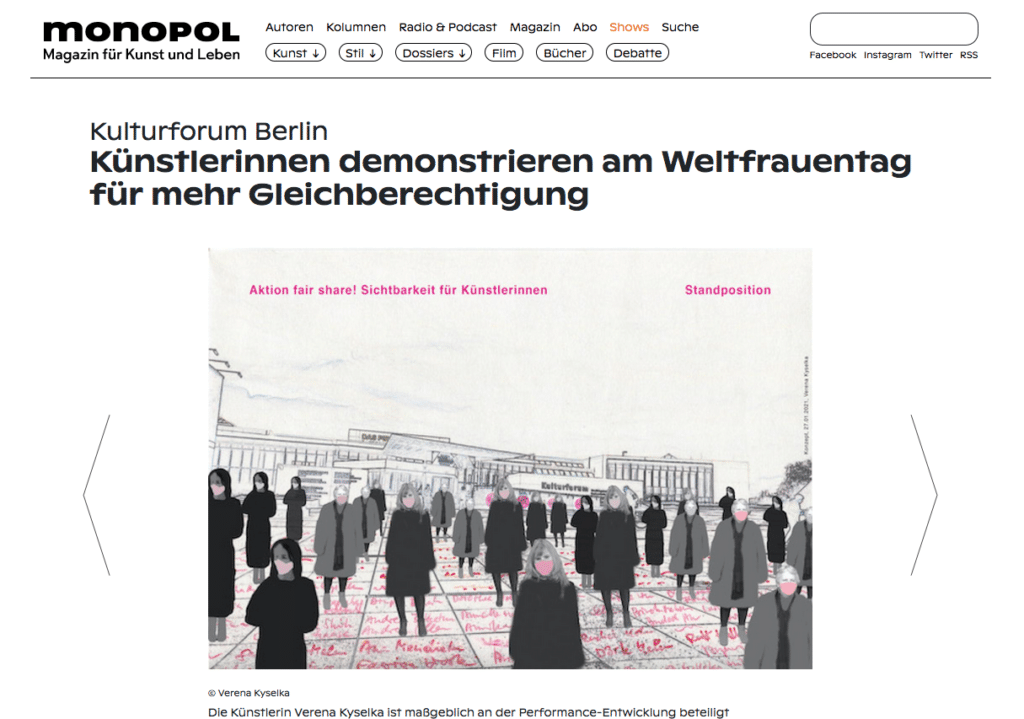2021 monopol
https://www.monopol-magazin.de/weltfrauentag-performance-kulturforum-berlin?slide=1

http://omanobserver.om/omani-songbook-exhibition-verena-kyselka/
Omani Songbook An exhibition by Verena Kyselka
Tuesday 29th, November 2016 / 19:05 in Features Mai Al Abri
By Mai Al Abria — Stal Gallery & Studio inaugurated “Omani Song Book”, the third exhibition of its current and expanding season by Berlin-based new media artist Verena Kyselka. The exhibition was launched last Sunday, November 27 under the auspices of Hans-Christian Freiherr von Reibnitz, the German Ambassador to the Sultanate of Oman. Over more than a decade, Verena Kyselka has developed and realized intercultural projects, which are motivated by discovery of “foreignness” in the homeland and the “familiarity” in a foreign country. The essential feature of her work is dealing with identity in intercultural comparison and the impact of contemporary history and cultural tradition on ethnic coexistence. In Oman, the artist was driven to explore the effects of tradition on the modern and growing city of Muscat — to what extent is the territory’s transformation process influential on the change which proceeds at breakneck pace? The songs and expressed stories have remained. They continued to exist and endure narrating myths and stories of the desert. How is longing or desire reflected in the songs? In collaboration with Omani artists, Kyselka recorded traditional Omani songs in Muscat and in al Sharqiya Sands. This exhibition sees the adaptation of Kyselka’s previous work with its new context. At the Bauhaus School in 1920’s Germany, there was a hidden agenda to restrict women to weaving while men could choose any branch they liked. The artist encapsulates the rich history of this weaving class – “The Women’s Class” in true Bauhaus concept – colors and shapes representing genders and age groups and wool pins that symbolize the life routes of each of the female Bauhaus artists from the former Women’s Class.
This context is being applied to the lives of Omani Bedouin women who earn their living from this traditional, archetypal and even symbolic practice. Simillary, Kyselka’s ‘Territory of Beauties’ is another work done in 2011. It was carried out in Taiwan and is now placed in an Omani context where parallels are found. Interestingly, the two cultures are clearly different but the perception of beauty and the kind of struggles women face are almost indistinguishable. The questions asked to female Taiwanese artists were focused on memories of the past, experiences of tradition, and the development of their personalities and artistic careers. The resulting work has been developed as visual poetry in cultural reflection of Taiwanese womanhood and contemporary female roles in a still very traditional society. It also deals with the similarities and differences concerning the life concepts, perspectives, and yearnings of women in an intercultural comparison. Another piece of work exploring the perceptions of beauty is based on the quote “A rose is a rose is a rose is…” written by the American poet Gertrude Stein. It is interpreted as meaning “things are what they are”, a statement of the law of identity. A rose is also considered the most beautiful of all flowers an archetypal symbol of the romantic era and also as a manifestation of the divine glamour of perfection in the Arab world. When it withers and starts to rot, the beauty and the allure is supposedly gone. But these German roses show the charm of fragility and lasting beauty, like the quote from the poem. The exhibition “Omani Song Book” concludes in December 12, 2016.